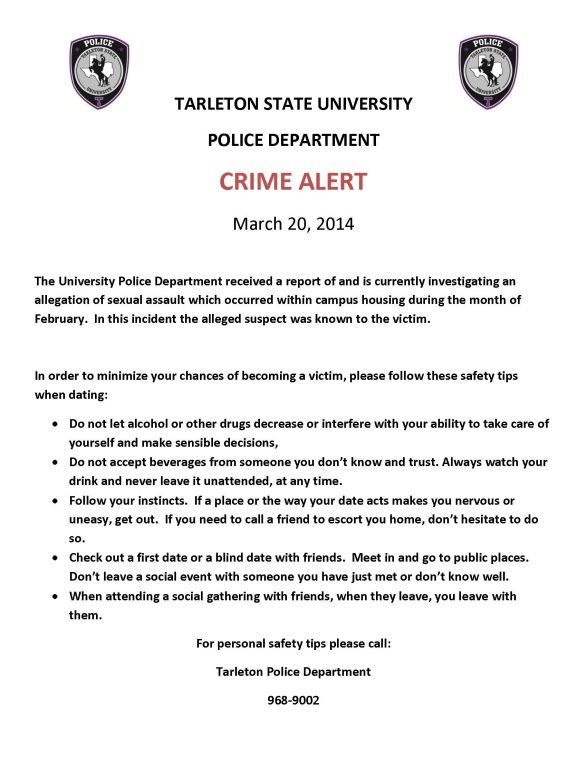Student speaks out against victim blaming
April 10, 2014
Following the latest sexual assault crime alert posted across Tarleton State University’s main campus and its other locations, a student spoke out to bring attention to the language of the safety tips posted with the crime alert.
Sarah Prisk, a Graduate student in the department of Counseling Psychology at the Waco campus, emailed Allcon to point out that the safety tips were structured in a way that could be perceived as blaming a victim for their attack. Part of her email explained Prisk’s perception.
“Your bulletin does nothing but insinuate that a victim of rape is to blame for his or her own assault because they were either intoxicated, accepted what seemed like an innocent beverage from a friendly stranger, or didn’t make good decisions,” Prisk said. “What your department, and so many others in this country, needs to understand is that it is not the victim we should be punishing; it is the perpetrator. Your tips to keep students safe are, I’m afraid, precisely what prevent nearly 75 percent of sexual assaults in this country from being reported each year. No victim wants to feel like the fault is their own because of what they were wearing, how much they had to drink, or who they were with. No victim is to blame for their own crime.”
Allcon spoke about receiving Prisk’s email.
“My initial reaction was a little surprised,” Allcon said. “I wasn’t surprised that we received a response, but I was surprised that the response said that the crime alert was basically placing blame on the victim. I was taken aback a little bit. I had to sit there and think about it, and take a critical look as to why that was perceived as placing blame. That’s something that causes me great concern. We don’t want to do that. We certainly don’t want to imply that.”
Prisk spoke about the current crime alert tips, and how, in her opinion, they don’t say anything females haven’t already heard before.
“I appreciate the steps your department is taking to keep Tarleton students safe,” Prisk said. “As a female, I have been told since the day I was born that there were certain places I should not go and certain behaviors in which I should not take part in because it is not safe for females to do so. I believe that many of the young ladies to whom your crime bulletin was sent have been told similar things. Therefore, I’m afraid that there is nothing new or groundbreaking in your crime bulletin that we haven’t heard before. As females in this world, we know how to keep ourselves safe.”
This feeling of having heard it all before is one of the reasons why Prisk spoke out against what she viewed as “victim-blaming” language within the mandated safety tips.
“We have certain guidelines, and we basically used a template from the Clery Act, that they had given us,” Allcon said. “It doesn’t really spell out what you have to put in the crime tips, just that you have to put the crime tips in there. One of the things I’ve got to credit her for, is that most of the time, when we receive criticism, it’s just that – just criticism – and she obviously gave a lot of thought to how you could do some things to remove that kind of language.”
Any institution of higher learning that receives federal funding is required to adhere to certain rules in dealing with situations involving crimes like robbery, aggravated assault, and sexual offenses. The Clery Act, first enacted in 1990, and most recently amended in 2008, requires that campus safety statistics and information be disclosed within 45 minutes of an assault being reported. In an effort to work towards having these required safety tips free of victim-blaming language, Allcon has asked Prisk if she will work with his team to revise the information that is sent out with each crime alert to be more neutral.
“I missed the part where she wasn’t here on Tarleton campus- that she was at another campus,” Allcon said. “So it may be difficult for her to actually be able to work directly with us, but the offer still stands.”
Ongoing discussions between various departments and campus police are looking at ways to implement new programs, or alter current ones, as a way to increase safety awareness. With Prisk’s correspondence, another aspect has been added to the talk that is occurring, one which will perhaps see changes made in the future.





